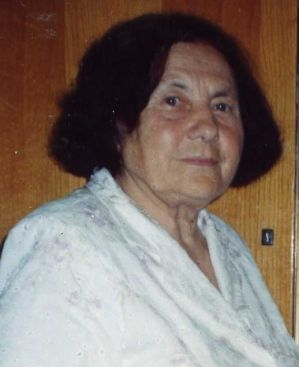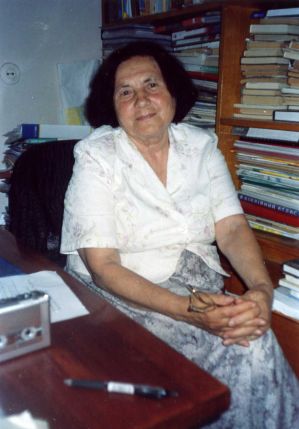Repressed for distributing samvydav. Philologist, educator.
From an educated peasant family. Her mother, Yosypa Hryhorivna (1903–1983), from the Buchynsky family, together with her maternal uncles, created a village theater at the “Prosvita” reading hall and was active in the Union of Ukrainian Women and the “Ridna Shkola” (Native School) society. Her father (1899–January 27, 1972) was orphaned at an early age. After marrying, he went to Canada to earn money. He returned in 1936 to bring his wife over, but she refused to go. The family had four children: Myroslava, Zenovia-Maria, Natalia, and Stefania. Their parents gave them a national upbringing. To attend secondary school, it was necessary to join the Komsomol. A UPA soldier gave Myroslava permission to do so in 1949. She finished school in the village of Lychkivtsi.
In 1956, Myroslava graduated with honors from the Chortkiv Pedagogical College. Even then, the KGB was interested in her. From 1956 to 1961, she studied at the Faculty of Philology at Lviv University. As part of a student brigade, she traveled to the Virgin Lands in Kazakhstan. From there, “signals” were sent that she was “conducting nationalist propaganda” (in reality, she had spoken with someone about Ukraine and Bohdan Khmelnytsky). Elected to the faculty’s Komsomol bureau, she worked in the culture section and organized the philology faculty’s choir. She was friends with her classmates—former political prisoners Halia Sokil and Olha Matseliukh (the future wife of Mykhailo HORYN). When they were expelled from the university in 1957, she and her friends went to Rector Yevhen Lazarenko to defend them.
She wanted to work as a researcher and in 1962 got a job at the university library, but she was soon fired. She worked as a proofreader at the newspapers “Vilna Ukraina” (Free Ukraine) and “Leninska Molod” (Lenin’s Youth), and as a literary editor in the publications department of the Lviv Oblast Archive.
In 1964, during the celebration of the 150th anniversary of T. Shevchenko’s birth, Z., on the instructions of M. HORYN, transported a selection of samvydav to Kyiv by tour bus, from where the materials were sent abroad.
She regularly received samvydav literature in typewritten and photocopied form from M. HORYN, and less frequently from I. KALYNETS, and gave it to friends to read (articles such as “Regarding the Trial of Pohruzhalsky,” “Class and National Struggle at the Current Stage of Human Development,” “Contemporary Imperialism,” the preface to the book “Panorama of Contemporary Ukrainian Literature,” the book “The Derivation of Ukraine’s Rights,” and I. DZIUBA’s speech at an evening in memory of V. SYMONENKO, among others). In August 1965, an employee of the V. Stefanyk Lviv National Scientific Library of the Academy of Sciences of the Ukrainian SSR asked for “something to read.” Someone confiscated these texts from him. A few days later, on August 24, 1965, Z. was detained on Stavropihiyska Street in Lviv. During a search of her apartment, five copies of the articles “Regarding the Trial of Pohruzhalsky,” “The ‘Sovietization’ of P. Tychyna” by I. Koshelivets, “A Reply to V. Symonenko’s Mother—H.F. Shcherban,” poems by V. SYMONENKO, and others were seized from bookmarks found in materials belonging to I. HEL and M. Kosiv.
The interrogations and protocols were conducted in Russian. It was not until October 25 that investigator Captain Klymenko switched to Ukrainian. Z., like many other Sixtiers, was not prepared for her arrest and did not know how to behave. She confirmed M. HORYN’s confession that she had received the samvydav literature from him. She was charged with conducting “anti-Soviet agitation and propaganda” under Part 1 of Article 62 of the Criminal Code of the Ukrainian SSR in the same case as Mykhailo and Bohdan HORYN and Mykhailo OSADCHY. During the investigation, she was brought in for conversations with high-ranking KGB officials, including the then-head of the Lviv Oblast KGB Directorate, V. Shevchenko. But she asked for nothing.
The accused was not given the opportunity to review the case files; she was told they had to be studied with a lawyer. From April 13–18, 1966, the Lviv Oblast Court sentenced M. HORYN to 6 years, B. HORYN to 3 years, and M. OSADCHY to 2 years in strict-regime camps, while Z. was sentenced to 8 months. At this trial, V. CHORNOVIL refused to testify on the grounds that the trial was closed and threw flowers to the defendants. When the convicted were led out, people shouted “Slava!” (Glory!) and threw flowers to them.
She was released from the pre-trial detention center on April 24, 1966. The head of the detention center conveyed a KGB order for her to immediately leave Lviv for her native village.
On May 28, 1966, the 110th anniversary of I. Franko’s birth, Z. visited Lviv to meet with acquaintances. Some offered a hand, while others ran away. She had nowhere to live and no means of support. Fortunately, Stepan Moroz, a geographer, was waiting for her release from prison. They married in August 1966. Their daughter, Yaryna, was born in 1968.
She appealed to Judge S. Rudenko, then to the head of the Lviv Oblast KGB Directorate, Poluden, and had the opportunity to speak with the deputy head of the KGB under the Council of Ministers of the Ukrainian SSR to have her passport returned and to be allowed to find work. After a long delay, General Poluden ordered her passport to be returned.
She found a job as a third-grade teacher at School No. 31, where Olha Matseliukh-Horyn also worked. Two years later, a trade union meeting resolved to fire her for “unprofessionalism.” The principal, Kostiantyn Ivanov, then at his own risk, transferred her to a position as a teacher of Ukrainian language and literature in the middle grades.
In the fall of 1969, Z., along with other former political prisoners, signed a statement addressed to the Chairman of the Verkhovna Rada of the Ukrainian SSR, O. Liashko, and the Prosecutor of the Ukrainian SSR, F. Hlukh, titled “ ‘Chamber’ Cases Again?”—protesting the re-sentencing of political prisoners S. KARAVANSKY, S. Bedrylo, and V. Ryvak, which was being prepared at the time.
In 1971, she set up a Lesia Ukrainka study room for the poet’s centenary. That same year, she was transferred to School No. 2. At a plenary meeting of teachers from the Radianskyi district of Lviv, Z. and Olha Horyn were declared nationalists. In 1972, immediately after the arrests of the Ukrainian intelligentsia, the pedagogical council banned Z. from organizing any more events following an evening of winter poetry and carols titled “To Good People for Their Health.” She declared: “I won’t be holding these events myself anyway, because my comrades have been arrested and my father has died.” During interrogations in the 1972 cases, she denied receiving samvydav from I. KALYNETS.
Z. conscientiously followed the school curriculum but raised Ukrainian, not Soviet, patriots. For example, her Pioneer detachments were not named after Valia Kotik or Pavlik Morozov, but after Oles Honchar and Oleksandr Dovzhenko, and her art studio was called “Tronka.” They would go with their vertep (Christmas puppet show) and carols to the Lviv branch of the Union of Writers of Ukraine, and later (in 1990) they traveled to Kyiv and sang carols for Lina KOSTENKO. When the school tried to push the studio out, they sought public support.
From 1992 to 1995, she worked in Mariyka Chumarna’s signature school of Ukrainian studies.
Along with her students, she participated in the founding meeting of the Society of the Ukrainian Language in Lviv in June 1988 and supported Ivan MAKAR. She headed the education commission of the Lviv regional TUM. She prepared the conference “The National School, the Teacher, and the Public,” where on December 3, 1989, she presented her concept of a national school (the first in Ukraine). The TUM operated a public lecture series where prominent people gave talks.
By a resolution of the plenum of the Supreme Court of the Ukrainian SSR on December 7, 1990, the verdict in the case of M. and B. HORYN, M. OSADCHY, and Z. was overturned, and the case was closed “for lack of corpus delicti.”
Since September 1990, Z. has been working at the regional Institute of Postgraduate Pedagogical Education. She taught courses for teachers from all over Ukraine and gave open lessons. She taught teachers from the Brest region, Mykolaiv Oblast, and Kryvyi Rih. She later focused on creating Ukrainian literature textbooks and methodological guides. One of them was illustrated by Halyna SEVRUK.
Since 1990, Z. has been an associate professor at the Department of Humanities Education at the Institute of Postgraduate Pedagogical Education. She was named an Honored Teacher of Ukraine in 1992.
Bibliography:
1.
Zvarychevska, M. The Concept of a National School, delivered on December 3, 1989, at the regional conference of the Taras Shevchenko Society of the Ukrainian Language and teachers of Lviv Oblast // Prosvita – No. 1. – 1990.
2.
V. Chornovil. Woe from Wit. – Lviv: Memorial, 1991. – 344 pp. (Reprint: Woe from Wit (Portraits of Twenty “Criminals”). A Collection of Materials. Compiled by Viacheslav Chornovil. Fourth, supplemented and revised edition. – First Ukrainian Printing House in France, 1968). – p. 84.
Chornovil V. Works: In 10 vols. – Vol. 2. “Justice or Recurrences of Terror?” “Woe from Wit.” Materials and Documents 1966–1969 / Compiled by Valentyna Chornovil. Foreword by Les Taniuk. – Kyiv: Smoloskyp, 2003. – pp. 15, 104, 129, 439.
Ukrainian Poetry on Trial by the KGB: The Criminal Cases of Iryna and Ihor Kalynets / Compiled by Yu.D. Zaitsev. – Lviv: I. Krypiakevych Institute of Ukrainian Studies of the National Academy of Sciences of Ukraine, 2003. – pp. 18-31, 36-40, 42-46, 421-426, 443-444, 472, 483-485, 488, 492, 495-496, 501-502, 508, 514, 523-526, 530, 538, 546-549.
Bohdan Horyn. Not Just About Myself: A Novel-Collage: In 3 books. – Book Two (1965–1985). – Kyiv: Univ. vyd-vo PULSARY, 2008. – 648 pp. – pp. 54, 59, 66-67, 78-79, 97-99, 131-141, 150-154, 222, 224, 234, 579-584.
KhPG Archive. Interview with Myroslava Zvarychevska on June 26, 2008.
Mykhailo Horyn. To Light a Candle / Kharkiv Human Rights Protection Group; Compiled by V.V. Ovsiienko; Art and design by B.Ye. Zakharov – Kharkiv: Prava Liudyny, 2009. – pp. 280-287.

ZVARYCHEVSKA MYROSLAVA VASYLIVNA

ZVARYCHEVSKA MYROSLAVA VASYLIVNA